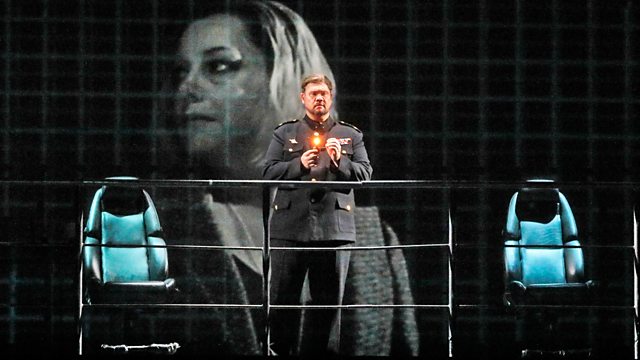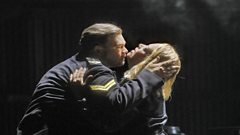
Wagner's Tristan und Isolde
From the Metropolitan Opera in New York, Simon Rattle conducts Wagner's tale of doomed love, Tristan und Isolde. Starring Nina Stemme, Stuart Skelton and Ekaterina Gubanova.
Tonight's opera from the Met is Wagner's tale of doomed love, Tristan and Isolde. Isolde has been promised to King Marke in marriage, and she and her handmaid Brangäne are being transported to his home in Cornwall. In charge of the ship is Tristan, who killed Isolde's previous fiancé. Isolde wants revenge, and prepares a poison for them both to drink, but she hasn't counted on Brangäne, who switches it for a love potion.
A cast of outstanding Wagnerians include Nina Stemme as Isolde, Stuart Skelton as Tristan, Ekaterina Gubanova as Brangäne, and René Pape as King Marke, with Sir Simon Rattle conducting, in one of his rare appearances at the Met.
Presented by Mary Jo Heath and Ira Siff.
Tristan.....Stuart Skelton (tenor)
Isolde.....Nina Stemme (soprano)
Brangäne.....Ekaterina Gubanova (mezzo)
Kurwenal.....Evgeny Nikitin (baritone)
Marke.....Rene Pape (bass)
Melot.....Neal Cooper (tenor)
A Shepherd.....Alex Richardson (tenor)
A Steersman.....David Crawford (bass baritone)
Sailor's voice.....Tony Stevenson (tenor)
New York Metropolitan Opera Chorus
New York Metropolitan Opera Orchestra
Simon Rattle (Conductor).
Last on
More episodes
Music Played
-
![]()
Richard Wagner
Act 1 of Tristan und Isolde
Singer: Stuart Skelton. Singer: Nina Stemme. Singer: Ekaterina Gubanova. Singer: Evgeny Nikitin. Singer: René Pape. Singer: Neal Cooper. Singer: Alex Richardson. Singer: Dave Crawford. Singer: Tony Stevenson. Choir: New York Metropolitan Opera Chorus. Orchestra: New York Metropolitan Opera Orchestra. Conductor: Sir Simon Rattle. -
![]()
Richard Wagner
Act 2 of Tristan und Isolde
Singer: Stuart Skelton. Singer: Nina Stemme. Singer: Ekaterina Gubanova. Singer: Evgeny Nikitin. Singer: René Pape. Singer: Neal Cooper. Singer: Alex Richardson. Singer: Dave Crawford. Singer: Tony Stevenson. Choir: New York Metropolitan Opera Chorus. Orchestra: New York Metropolitan Opera Orchestra. Conductor: Sir Simon Rattle. -
![]()
Richard Wagner
Act 3 of Tristan und Isolde
Singer: Stuart Skelton. Singer: Nina Stemme. Singer: Ekaterina Gubanova. Singer: Evgeny Nikitin. Singer: René Pape. Singer: Neal Cooper. Singer: Alex Richardson. Singer: Dave Crawford. Singer: Tony Stevenson. Choir: New York Metropolitan Opera Chorus. Orchestra: New York Metropolitan Opera Orchestra. Conductor: Sir Simon Rattle. -
![]()
Giuseppe Verdi
String Quartet in E minor
Performer: Vogler Quartett.
Wagner's Tristan und Isolde
ACT I
Isolde, an Irish princess, is being taken by ship from Ireland to Cornwall by Tristan, whose uncle, King Marke, plans to marry her. She becomes enraged by a sailor’s song about an Irish girl, and her maid, Brangäne, tries to calm her. Isolde interrogates Tristan, but he replies evasively. His companion Kurwenal loudly ridicules the Irish women and sings a mocking verse about Morold, Isolde’s fiancé, who was killed by Tristan when he came to Cornwall to exact tribute for Ireland. Isolde, barely able to control her anger, tells Brangäne how the wounded Tristan came to her in disguise after his fight with Morold so that he could be healed by Isolde’s knowledge of herbs and magic (“Wie lachend sie mir Lieder singen”). Isolde explains to Brangäne that she recognized Tristan, but her determination to take revenge for Morold’s death dissolved when he pleadingly looked her in the eyes. She now bitterly regrets her reluctance to kill him and wishes death for him and herself. Brangäne reminds her that to marry a king is no dishonor and that Tristan is simply performing his duty. Isolde maintains that his behavior shows his lack of love for her, and asks Brangäne to prepare a death potion. Kurwenal tells the women to get ready to leave the ship, as shouts from the deck announce the sighting of land. Isolde insists that she will not accompany Tristan until he apologizes for his offenses. He appears and greets her with cool courtesy (“Herr Tristan trete nah”). When she tells him she wants satisfaction for Morold’s death, Tristan offers her his sword, but she will not kill him. Instead, Isolde suggests that she and Tristan make peace with a drink of friendship. He understands that she means to poison them both, but still drinks, and she does the same. Expecting death, they exchange a long look of love, then fall into each other’s arms. Brangäne admits that she has in fact mixed a love potion, as sailors’ voices announce the ship’s arrival in Cornwall.
ĚýACT II
In a garden outside Marke’s castle. Distant horns signal the king’s departure on a hunting party. Isolde waits impatiently for a rendezvous with Tristan, believing that the party is far off, but Brangäne warns her about spies, particularly Melot, a jealous knight whom she has noticed watching Tristan. Isolde replies that Melot is Tristan’s friend. She sends Brangäne off to stand watch and puts out the warning torch. When Tristan appears, she welcomes him passionately. They praise the darkness that shuts out the light of conventionality and false appearances and agree that they feel secure in the night’s embrace (“O sink hernieder, Nacht der Liebe”). Brangäne’s distant voice warns that it will be daylight soon (“Einsam wachend in der Nacht”), but the lovers are oblivious to any danger and compare the night to death, which will ultimately unite them. Kurwenal rushes in with a warning: the king and his followers have returned, led by Melot, who denounces the lovers. Moved and disturbed, Marke declares that it was Tristan himself who urged him to marry and choose the bride. He does not understand how someone so dear to him could dishonor him in such a way (“Tatest Du’s wirklich?”). Tristan cannot answer. He asks Isolde if she will follow him into the realm of death. When she accepts, Melot attacks Tristan, who falls wounded into Kurwenal’s arms.
ĚýACT III
Tristan lies mortally ill outside Kareol, his castle in Brittany, where he is tended by Kurwenal. A shepherd inquires about his master, and Kurwenal explains that only Isolde, with her magic arts, could save him. The shepherd agrees to play a cheerful tune on his pipe as soon as he sees a ship approaching. Hallucinating, Tristan imagines the realm of night where he will return with Isolde. He thanks Kurwenal for his devotion, then envisions Isolde’s ship approaching, but the shepherd’s mournful tune signals that the sea is still empty. Tristan recalls the melody, which he heard as a child. It reminds him of the duel with Morold, and he wishes Isolde’s medicine had killed him then instead of making him suffer now. The shepherd’s tune finally turns cheerful. Tristan gets up from his sickbed in growing agitation and tears off his bandages, letting his wounds bleed. Isolde rushes in, and he falls, dying, in her arms. When the shepherd announces the arrival of another ship, Kurwenal assumes it carries Marke and Melot, and barricades the gate. Brangäne’s voice is heard from outside, trying to calm Kurwenal, but he will not listen and stabs Melot before he is killed himself by the king’s soldiers. Marke is overwhelmed with grief at the sight of the dead Tristan, while Brangäne explains to Isolde that the king has come to pardon the lovers. Isolde, transfigured, does not hear her, and with a vision of Tristan beckoning her to the world beyond (“Mild und leise”), she sinks dying upon his body.
- See more at:
Broadcast
- Sat 8 Apr 2017 17:00Â鶹Éç Radio 3


